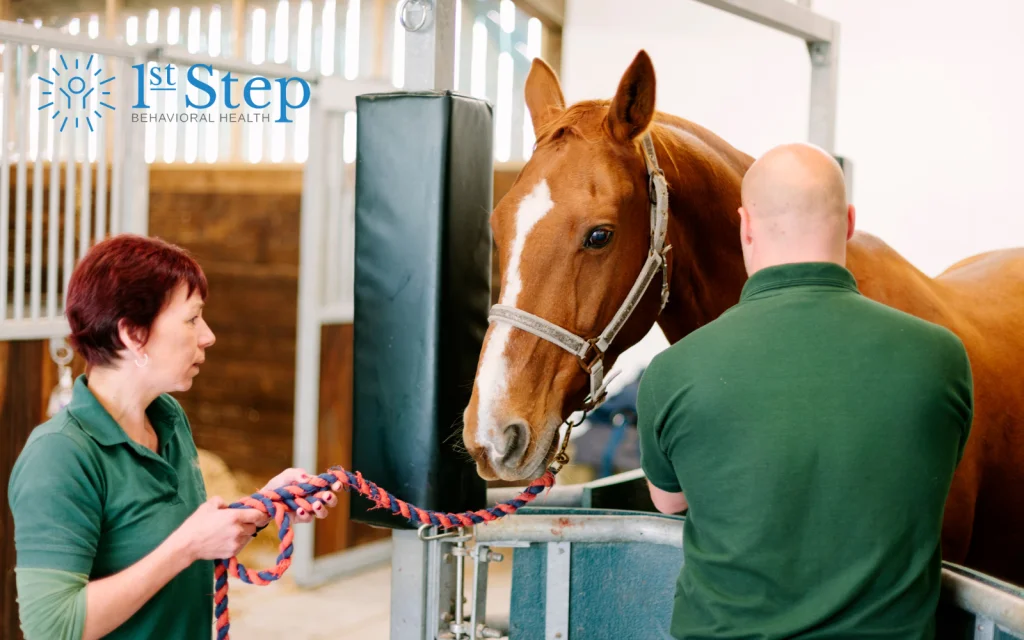Addiction is a complex condition that requires comprehensive, holistic treatment. Along with medications and mental health treatment, people living with addiction must learn new ways of coping with stress and develop healthy routines that support lifelong sobriety.
Equine therapy is a holistic therapy people can use during addiction treatment. Working with horses can have significant benefits and help people achieve long-term recovery from addiction.
This article will explore the benefits of equine therapy during addiction treatment. You will learn what to expect in an equine therapy program and where to find effective treatment.
Contact the First Step Behavioral Health specialists now to explore our holistic addiction treatment programs.
What is Equine Therapy?
Equine therapy is a therapeutic method that includes spending time with horses. People in equine therapy programs may spend time grooming or leading a horse. Equine therapy may consist of horseback riding as well.
Mental health professionals may lead equine therapy sessions. They provide supervision and help to guide the therapeutic activities.
Horses are sensitive to people’s feelings. They naturally react to human emotions and behaviors and have unique personalities of their own. Engaging with horses can help people recover from a range of conditions, including:
- Trauma
- Post-traumatic stress disorder (PTSD)
- Substance abuse
- Depression
- Anxiety
- Attention deficit hyperactivity disorder (ADHD)
- Cerebral palsy
- Eating disorders
Horseback riding has many physical benefits, including improved balance, strength, and coordination. It can also significantly improve mental health.
People have been using equine therapy to treat a range of conditions since 600 B.C. In 1945, people in Scandinavia began using this therapy for people recovering from polio.
Equine therapy became popular in the United States beginning in 1960. Since then, many mental health and substance abuse treatment programs have started to incorporate it into treatment plans.
7 Benefits of Equine Therapy in Addiction Treatment
Equine therapy and other animal-assisted therapies can benefit people with substance use disorders (SUD) or mental health conditions.
Here is an overview of 7 benefits of equine-assisted therapy.
1. Emotional awareness
Horses are sensitive to people’s emotions. If you are anxious or worried, your horse will sense it and respond.
Spending time with horses can help you identify your emotional state. Being more aware of your feelings can help you develop and use skills to manage them.
2. Trust
Many people have to rebuild their trust in others during addiction recovery. Learning to trust an animal that weighs up to 1500 pounds can be a profound experience. Riding horses or simply spending time with them can help you learn to trust another being again.
Horses are intuitive and often want to connect with people. Forming a trusting relationship with a horse can be a profound experience that helps you connect with others, too.
3. Holistic treatment
Addiction is a complex condition. It often has roots in your past experiences, emotions, genetics, and behaviors. It is essential to address each aspect of your addiction so that you can put it in the past.
Holistic treatment includes care for every part of you. It may include:
- Traditional talk therapy
- Medications
- Mental health disorder treatment
- Group therapy
- Family therapy
- Relapse prevention education
The benefits of equine therapy include better self-esteem, improved health, and reduced stress. Incorporating equine therapy in a holistic treatment program can have many significant benefits and may support longer-lasting recovery.
4. Improved social skills
Working with horses requires guidance from a trained professional. During sessions, you may learn how to collaborate with a mentor. You may also find emotional support from the horses and your peers as you learn new skills.
These aspects of equine therapy can impact your social skills and help you feel connected to those around you.
5. Calm and clarity
Spending time around horses can have a grounding, calming effect. Additionally, you may find that using gentle movements and a soft voice can have a soothing effect on both you and your horse.
6. Routine
Life with addiction can feel disorganized or chaotic. Developing a routine that includes equine therapy sessions can help you build healthy habits that support long-term recovery.
Many aspects of horseback riding and caring for a horse require focus and repetition. Developing the skills to stay focused on these tasks can translate to better focus and attention in other areas of your life.
7. New purpose
Finding your purpose in recovery is essential. You must discover things that bring you a sense of joy and meaning as you work to put substance abuse in the past.
Equine therapy can help you discover a new interest or sense of purpose–and it can be a lot of fun.
Learn More About Equine Therapy
At First Step Behavioral Health, we believe that everyone deserves compassionate, holistic addiction treatment. We partner with The Lucky Horse Sanctuary, a local house rescue, to offer equine therapy as part of our addiction treatment programs. Contact our specialists now to learn more about the benefits of equine therapy or to schedule an intake appointment.

